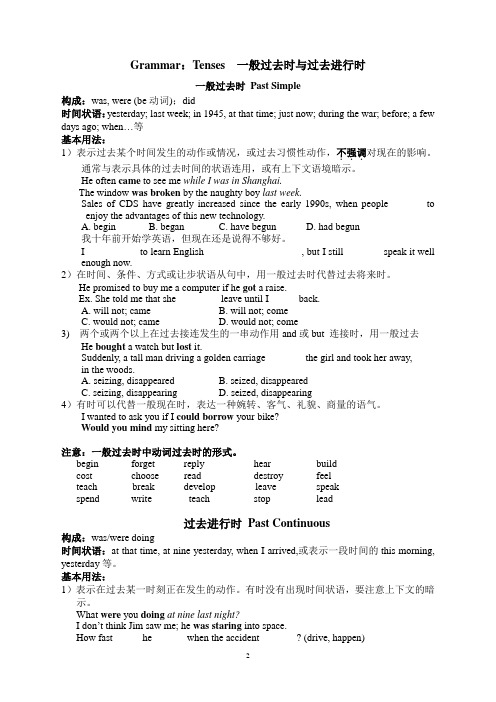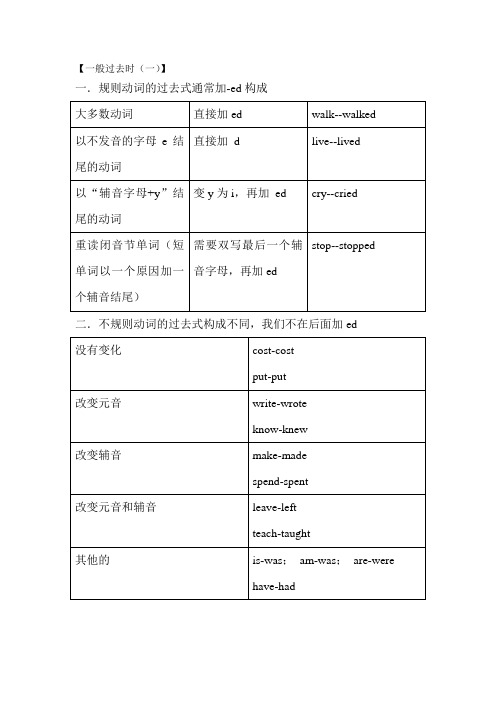Grammar七年级英语下册——一般过去时
(完整)初中英语语法一般过去时

(完整)初中英语语法一般过去时教育专区初中教育英(完整)初中英语语法一般过去时一:构成1. Be 动词的一般过去时态.在没有实义动词的句子中使用be动词, am is 的过去式为was; are的过去式为were.构成:肯定句:主语+was (were) +表语如:I was late yesterday. (昨天我迟到了。
)否定句:主语+was (were) +not+表语如:We weren't late yesterday. (我们昨天没迟到)【注意】:当句中含有系动词was,were时,可直接在其后加not 构成否定句。
如:I was on the Interntwhen you called me.当你打给我时,我在上网。
→ :I was notwasn'ton the Internt when you called me .当你打给我时,我不在上网。
疑问句:Was (Were) +主语+表语如:Were you ill yesterday? (你昨天病了吗?)肯定回答:Yes,I was. (是的,我病了。
)否定句:No,I wasn't. (不,我没病。
)特殊疑问句:特殊疑问词+was (were) +主语+表语如:When were you born? 你是什么时候出生的?2.实义动词的一般过去时态肯定句要使用动词的过去式,否定句和疑问句要使用助动词do和does 的过去式 did.肯定句为:主语+动词过去式+宾语如:I went home at nine o'clock yesterday.(我昨天九点钟回的家。
)否定句:主语+didn't +动词原形+宾语如:I didn't go home yesterday. (我昨天没回家。
)疑问句:Did +主语+动词原形+宾语如:Did you go home yesterday? (你昨天回家了吗?)肯定回答:Yes,I did. (是的,我回了。
七年级英语下册(人教版)课件:Unit 11 单元语法专题—Grammar Focus

went 二、用括号内所给单词的适当形式填空。 11.I ________(go) shopping were with my mother yesterday. 12.His parents __________(be) farmers before,but now they are(be)
workers. was 13.The weather ________(be) bad last weekend.
4.一般过去时的句型
①含be动词句型的过去时: a)肯定句:主语+was/were+表语+(其他).
b)否定句:主语+was/were+not+表语(+其他).
c)一般疑问句:Was/Were+主语+表语(+其他)? eg:I was at home yesterday.昨天我在家。
I was not at home yesterday.我昨天不在家。
14.He _____________(study) at this school at the age of ten. studied
15.—Did you _________(see) anything there last night? see —Yes,I ___________(see) many stars.They were so beautiful.
eg:study→studied;worry→worried d) 末尾只有一个辅音字母的重读闭音节单词 , 先双写这个辅音字母 ,
再加-ed
eg:stop→stopped;plan→planned e)不规则变化
eg:do→did;go→went;have→had;eat→ate;
buy→bought;write→wrote
外研版七年级英语下册Module 7《My past life》复习:一般过去时课件(14张ppt)

D. Is; after
5. —WBho was on duty last Friday﹖
—______.
A. I am
B. I was
四、按要求改写下面的句子 1.。I was born in Shandong. (一般疑问句)
_W__er_e__y_o_u_b_o_r_n__ in Shandong? 2. There is a pond near my house.
三、选择填空
1. My fatherC__ill yesterday.
A. isn't B. aren't C. wasn't D. weren't
2. _D_your parents at home last week﹖
A. Is
B. Was
C. Are D. Were
3. The twinsB___ in Dalian last year.
7
Unit 2 I was born in Quincy
一般过去时(1)
详见课本P97--98
Grammar: Be动词的一般 过去时
1.一般过去时的概念:表示过去发生而现 在已经结束的事件、动作或情况。
2.一般过去时中,所有的动词必须用过去 式,除了be动词的过去式有人称和数 的变化外,其余动词的过去式都没有 人称和数的变化。
Be动词过去式:
is/am—was
are--were
一般过去时的肯定句、否 定句和疑问句中的be动词
1.肯定句变化如下:
结构:主语+was/were+其他 2.否定句 结构:主语+was/were+not+其他 3.一般疑问句及其回答 结构:Was/Were+主语+其他? 4.特殊疑问句及其回答 结构:特殊疑问词+was/were+主语+其他?
七年级下册英语1~12单元grammarfocus

七年级下册英语1~12单元grammarfocus摘要:一、前言二、七年级下册英语1~12单元grammar focus 概述1.单元一:一般现在时2.单元二:一般过去时3.单元三:一般将来时4.单元四:现在进行时5.单元五:过去进行时6.单元六:将来进行时7.单元七:现在完成时8.单元八:过去完成时9.单元九:将来完成时10.单元十:现在完成进行时11.单元十一:过去完成进行时12.单元十二:将来完成进行时三、结论正文:一、前言英语语法是英语学习的重要组成部分,对于提高学生英语水平具有重要意义。
七年级下册英语教材的grammar focus 部分涵盖了各种时态的用法,是学生掌握英语语法的重要途径。
二、七年级下册英语1~12单元grammar focus 概述1.单元一:一般现在时一般现在时表示经常发生的动作或存在的状态。
例如:I study English every day.2.单元二:一般过去时一般过去时表示过去某个特定时间发生的动作或存在的状态。
例如:I studied English yesterday.3.单元三:一般将来时一般将来时表示将来某个时间会发生的动作或存在的状态。
例如:I will study English tomorrow.4.单元四:现在进行时现在进行时表示现在正在进行的动作。
例如:I am studying English now.5.单元五:过去进行时过去进行时表示过去某个特定时间正在进行的动作。
例如:I was studying English at 8 o"clock last night.6.单元六:将来进行时将来进行时表示将来某个特定时间将要进行的动作。
例如:I will be studying English at 8 o"clock tomorrow.7.单元七:现在完成时现在完成时表示过去发生的动作对现在产生的影响。
例如:I havestudied English.8.单元八:过去完成时过去完成时表示过去某个时间点之前已经完成的动作。
语法-一般过去时与过去进行时

Grammar:Tenses 一般过去时与过去进行时一般过去时Past Simple构成:was, were (be动词);did时间状语:yesterday; last week; in 1945, at that time; just now; during the war; before; a few days ago; when…等基本用法:1)表示过去某个时间发生的动作或情况,或过去习惯性动作,不强调...对现在的影响。
通常与表示具体的过去时间的状语连用,或有上下文语境暗示。
He often came to see me while I was in Shanghai.The window was broken by the naughty boy last week.Sales of CDS have greatly increased since the early 1990s, when people ______ to enjoy the advantages of this new technology.A. beginB. beganC. have begunD. had begun我十年前开始学英语,但现在还是说得不够好。
I __________ to learn English ___________________, but I still _______ speak it wellenough now.2)在时间、条件、方式或让步状语从句中,用一般过去时代替过去将来时。
He promised to buy me a computer if he got a raise.Ex. She told me that she ________ leave until I _____ back.A. will not; cameB. will not; comeC. would not; cameD. would not; come3) 两个或两个以上在过去接连发生的一串动作用and或but 连接时,用一般过去He bought a watch but lost it.Suddenly, a tall man driving a golden carriage _______ the girl and took her away, ____ in the woods.A. seizing, disappearedB. seized, disappearedC. seizing, disappearingD. seized, disappearing4)有时可以代替一般现在时,表达一种婉转、客气、礼貌、商量的语气。
译林版英语七年级下册7B Unit 5 grammar(一般过去时)

【一般过去时(一)】一.规则动词的过去式通常加-ed构成二.不规则动词的过去式构成不同,我们不在后面加ed三.一般过去时的句式变化:1.句中有Be动词的一般过去时的句式变化:带有was或were的句子,其否定、疑问的变化和is, am, are一样,即否定句在was或were后加not,一般疑问句把was或were调到句首。
2.实义动词一般过去时的句式变化否定句:didn’t +动词原形,如:Jim didn’t go home yesterday.一般疑问句:在句首加did,句子中的动词过去式变回原形。
如:Did Jim go home yesterday?特殊疑问句:⑴疑问词+did+主语+动词原形?如:What did Jim do yesterday?⑵疑问词当主语时:疑问词+动词过去式?如:Who went to home yesterday?四.常用的表示过去的时间状语:通常用“时间+ago的短语a moment ago:last引导的时间短语:last year/week/Saturday,just now(刚才), yesterday,the day before yesterday(前天),in1998…”等。
练一练:一、用所给动词的适当形式填空1. Jim and Gina _________ (come) to china last month.2. Mike _______________ (not go) to bed until 10 o’clock last night.3. Mary _________ (read) English yesterday morning as usual.4. There ______ (be) no one here a moment ago.5. I _______ (call) mike this morning, but he did not reply.6. I listened but ________ (hear) nothing.7. Mike ________ (begin) to learn Chinese last year.8. Last week we __________ (pick) some apples on the farm.9. My mother ______________ (not do) housework yesterday and she had a rest.10.________your father_____ (go) to work every day last year?二、句型转换1. The children had a good time in the park. (改为否定句)The children ________ ______ a good time in the park.2. The artist can draw three-D pictures. He uses chalks.(合并为一句)The artist can draw three-D pictures____________________.3. Ann did her homework yesterday evening. (对划线部分提问)________ __________ Ann ______ her homework?4. She usually has some bread for lunch. (用the day before yesterday改写句子) She _______ _______ ________ for lunch the day before yesterday.5. Frank read an interesting book about history yesterday.(改为一般疑问句)______ Frank _______ an interesting book about history yesterday?三、单项选择( ) 1. Yesterday I met Amy ____________.A. on my way homeB. in my way homeC. on my way to homeD. in my way to home( ) 2. —Tom, are you ___________ me?—Yes. I can ___________ every word you said just now.A. hearing; hearB. listening to; listenC. listening to; hearD. hearing; listen( ) 3. Jenny went into the room, took off her coat and ______ down on a sofa.A. sitsB. satC. is sittingD. will sit( ) 4. There _____ lots of people at the restaurant when I got there.A .is B. was C. are D. were( ) 5. I am __________ the bl ackboard, but I can’t _________ anything.A. looking; seeB. seeing; look atC. looking at; seeD. seeing; look( ) 6. _____ she afraid of _____ late for school?A. Is; beB. Does; beC. Is; beingD. Does; being ( ) 7. Let’s take it _________.A. our homeB. schoolC. the schoolD. home( ) 8. The students are _______ to know that there are no bones in the back of elephants’ feet.A. surprisingB. surprisedC. surpriseD. surprisely。
初中英语语法-八大时态之一般过去时课件全文

一般过去时疑问句
对于含有是实意动词的句子, 一般疑问句: Did +主语+动词其他…? 特殊疑问句:疑问词+ did(didn’t)+主语+其它? What did you do yesterday? Why did you go there the day before yesterday? Whose father came to see our teacher just now?
Theyw_e_r_e from Japan. I _w_a_s very tired.
4. He is too young to go to school.
Hew_a_s_too young to go to school.
5. You are late for school. Youw_e_r_e late for school.
一般过去时-不含有be动词型
把句子中的动词改为过去式形式。
通常有5种写法。
动词过去式的写法:
01 一般情况词尾加ed 02 e结尾直接在词尾加d 03 辅音加y结尾变y为i加ed 04 重读闭音节结尾双写词尾字母加ed 05 特殊情况
I work in this city. I worked in this city last year.
We are friends.
We weren't friends.
2.当谓语动词是实意动词时,它 与助动词did有关
主语+did + not+ 动词
动词谓语一定要恢复为原形。
一般过去时否定式
主语+did + not+ 动词原型
grammar--过去分词做定语和一般过去式

grammar--过去分词做定语和⼀般过去式Grammar —The -ed form used as attributives and the simple past tense⼀. 过去分词(短语)做定语分词是动词的⼀种⾮谓语形式,在句中可做定语、状语、补⾜语和表语。
有两种形式,⼀种是现在分词(v.-ing),⼀种是过去分词(v.-ed)。
现在分词⼀般表⽰主动和进⾏的意思,过去分词⼀般表⽰被动和完成的意思。
以下主要是过去分词(短语)做定语的⼏点⽤法。
1. 及物动词的过去分词做定语,表被动和完成。
a broken cup ⼀个破杯⼦ a wounded soldier ⼀个受伤的⼠兵respected leaders 受⼈尊敬的领导们trained camels 受过训练的骆驼们an abandoned farm ⼀个废弃的农场2. 不及物动词的过去分词没有被动的意义,只表⽰动作的完成.a grown woman ⼀位成年妇⼥an escaped prisoner⼀名逃犯a fallen tree ⼀棵倒下的树the retired manager 退休经理fallen leaves 落叶the risen sun 已升起的太阳3. 过去分词可构成合成词作定语。
man-made satellite ⼈造卫星half-finished products 半成品highly-developed industry ⾼度发达的⼯业widely-used language ⼴泛应⽤的语⾔4. 过去分词或短语作定语时,相当于⼀个定语从句。
the color TV set produced last year =the color TV set that were produced last year 去年⽣产的彩⾊电视机a letter written by my daughter =a letter which/that is written by my daughter ⼀封我⼥⼉写给我的信a young girl dressed in white= a young girl who was dressed in white⼀个穿⽩⾐服的年轻⼥孩the food cooked by experts = the food which/that was cooked by experts 烹饪专家做的⾷物5. 过去分词做定语的位置:1)单个的过去分词作定语常放在所修饰的名词之前,叫前置定语。
- 1、下载文档前请自行甄别文档内容的完整性,平台不提供额外的编辑、内容补充、找答案等附加服务。
- 2、"仅部分预览"的文档,不可在线预览部分如存在完整性等问题,可反馈申请退款(可完整预览的文档不适用该条件!)。
- 3、如文档侵犯您的权益,请联系客服反馈,我们会尽快为您处理(人工客服工作时间:9:00-18:30)。
语法精讲
一般过去时(Ⅰ)
1、一般过去时的基本定义
一般过去时表示在过去某一时间发生的动作或存在的状态,也可以表示在过去某一阶段经常或反复发生的动作。
2、与一般过去时连用的时间状语
yesterday(昨天),last week/month/year(上周/上个月/去年),two days/months ago(两天/两个月前),the day before yesterday(前天),in 2000(在2000年),in those days(在那些日子里),just now(刚才),a moment ago(刚才)等常与一般过去时连用。
3、一般过去时的句式结构
(1)、含be动词的过去时的句式
①肯定句:主语+was/were+其他.如:
I was late for school yesterday morning.昨天早上我上学迟到了。
②否定句:主语+was/were+not+其他.如:
The school trip wasn't interesting last week.上周的学校旅行不是很有趣。
③一般疑问句:Was/Were+主语+其他?
肯定回答:Yes,主语+was/were.
否定回答:No,主语+wasn't/weren't.如:
—Were you late yesterday?你昨天迟到了吗?
—Yes,I was./No,I wasn't.是的,我迟到了。
/不,我没有迟到。
(2)含实义动词的过去时的句式
①肯定句:主语+动词过去式+其他.如:
They had a good time yesterday.他们昨天玩得很开心。
②否定句:主语+did not(didn't)+动词原形+其他.如:
They didn't watch TV last night.昨天晚上他们没有看电视。
③一般疑问句:Did+主语+动词原形+其他?
肯定回答:Yes,主语+did.
否定回答:No,主语+didn't.如:
—Did you go to the park yesterday?昨天你去公园了吗?
—Yes,I did./No,I didn't.是的,我去了,/不,我没去。
④特殊疑问句:疑问词+did+主语+动词原形+其他?如:
What time did you finish your homework?你什么时候做完家庭作业的?
4、动词过去式的构成
Exercise
Ⅰ、用括号内所给单词的适当形式填空。
1、—What day was(be) it yesterday?
—It was(be) Friday.
2、We were(be) students two years ago.
3、I bought(buy) a new dictionary the day before yesterday.
4、We often played(play) games last term.
5、She gave(give) me a book a moment ago.
6、The girl got(get) up very early this morning.
7、They took(take) photos near the river an hour ago.
8、He didn't watch(not watch) TV yesterday evening.
9、—Why was(be) the boy late for school?
—Because he was(be) ill.
10、I went home late last night.My mother worried(worry) about me a lot.
一般过去时(Ⅱ)
一般过去时的特殊疑问句
特殊疑问句是由疑问代词(who,what,which)和疑问副词(where,when,why,how)引导的疑问句。
一般过去时的特殊疑问句有以下几类:
1、疑问词在句中不充当主语时,其句型结构:
(1)疑问词+was/were+主语+其他?如:
How was your weekend?你的周末过得怎么样?
(2)疑问词+did+主语+动词原形+其他?如:
What did you do yesterday?昨天你做什么了?
Who did you go to the park with?你和谁一起去的公园?
2、疑问词在句中充当主语时,其句型结构:
(1)疑问词+was/were+表语+其他?如:
Who was here just now?刚才谁在这儿?
(2)疑问词+行为动词的过去式+其他?如:
Who cleaned our classroom yesterday?昨天谁打扫了我们的教室?
【拓展】一般过去时的判断
(1)当句中用到表示过去的时间状语时,用一般过去时。
这样的状语有以下几类:
①yesterday构成的相关词组,如:yesterday morning,at five o'clock yesterday等。
②last构成的相关词组,如:last week,last year,last Sunday afternoon等。
③“一段时间+ago”表示“……(多久)以前”,如:ten years ago,three days ago等。
④表示过去的时间短语,如:in the 1990s,on May 1st 1892,in the old days等。
(2)根据句意确知某一动作发生在过去,用一般过去时。
如:
Edison invented many useful things.爱迪生发明了许多有用的东西。
(3)表示时间、让步或结果的状语从句,一般主句用过去时,从句也用过去时。
如:
The man drank some water after he got up in the morning.那个男人在早上起床后喝了一些
水。
Exercise Ⅰ、根据答语,用适当的疑问词完成下列对话。
1、—Where did you go last weekend?
—I went to the zoo with my parents.
2、—How was the weather yesterday?
—It was sunny.
3、—What did Tim and his brother do yesterday?
—They played soccer in the park.
4、—Who found the lost dog?
—Betty did.
5、—Why did you play badminton with your friends?
—Because it was really exciting.
Ⅱ、对句中画线部分提问,每空一词。
6、Susan washed her clothes yesterday afternoon.
What did Susan do yesterday afternoon?
7、Bill cleaned the room with Jack this morning.
Who cleaned the room with Jack this morning?
8、They went to the village last month.
Where did they go last month?
9、Helen joined the club three weeks ago.
When did Helen join the club?
10、Our school trip was great.
How was your school trip?
Ⅲ、补全对话。
从方框中选出适当的选项补全对话。
A:__11__
B:It was great.We enjoyed ourselves.
A:__12__
B:Well,on Sunday we went to the beach and played volleyball there.
A:13
B:I played with Linda.And we went boating on Sunday.
A:Really?__14__
B:On Daming Lake.__15__
A:No,I stayed at home.I had too much homework.
A、Did you go out?
B、How was your weekend?
C、Where did you go boating?
D、What did you do?
E、Who did you play with?
11.B12.D13.E14.C15.A。
